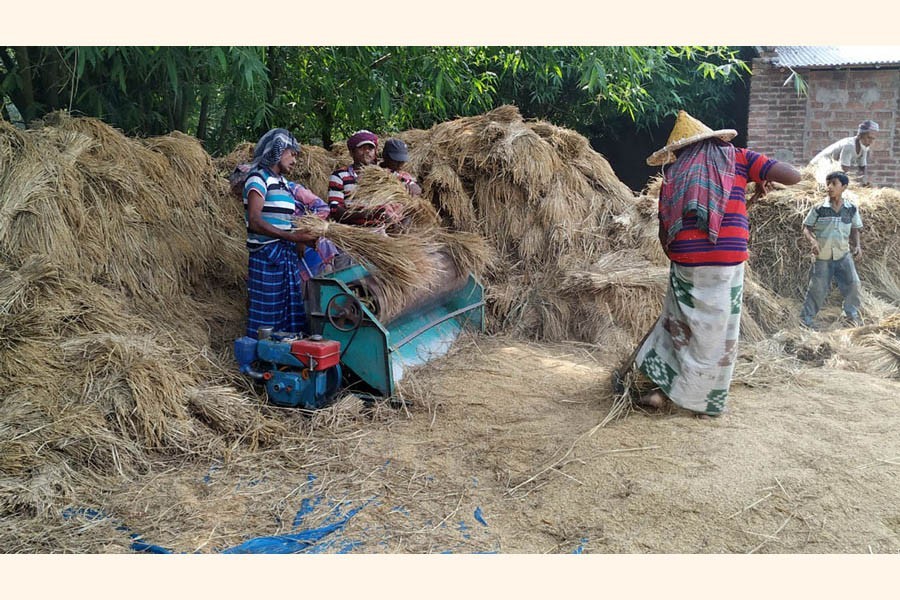In a major policy shift, the government is planning to purchase Boro harvest directly from the farmers this season to help ensure a fair price for the latter and boost its own stock.
On April 01, the cabinet division recommended that the food ministry take necessary steps to this effect, an official said.
The move comes against the backdrop of an unprecedented fall in rice stock of the state silos. The stock is now estimated at 0.39-million tonnes against a minimum comfortable stock of 1.2-million tonnes.

The official said the cabinet division suggested the ministry directly procure its desired volume of rice from the growers. This will also offer a fair price to the latter, he added.
In a letter addressed to both food and commerce ministries, the cabinet division said rice procurement from farmers can also help stabilise the already volatile rice market.
Market experts opined that the government failed to achieve its procurement targets during the last Boro and Aman seasons, resulting in a low public food stock and market volatility.
The International Food Policy Research Institute (IFPRI) is a recent research study that has suggested direct procurement of paddy from the farmers.
The food ministry data, updated on April 07, showed rice stock declined to just 0.39-million tonnes which is less than half the stock maintained during this period last year.
The food directorate needs a minimum of 0.6-million tonnes of rice until June 2021 for its safety-net programmes, an official at the directorate said.
An official said the directorate could meet only 47 per cent of its targeted procurement in the 2020 Boro season while it was only 12 per cent in the immediate past Aman season.
It was due to higher prices of the staple in the mainstream market than that offered by the government, he added.
The official said Boro harvest has already begun in the haor (wetland) region while it will begin in full swing from the first week of May across the country.
The directorate is expecting to fulfil its procurement target this season.
The official said they raised the rice import target to 1.55-million tonnes from the 1.4-million tonnes set earlier.
The government recently approved the import of another 1.5-million tonnes of rice from India, he added.
Agricultural economist Prof Golam Hafeez Kennedy opines that direct procurement from farmers is a pragmatic step, but the government must ensure its 'implementation'.
"Both the paddy and rice procurement drive during Aman season proved almost futile amid the government's weakness in price fixation," he said.
Before buying rice directly from farmers, Prof Kennedy said, there should be a study on their capacity to supply husked rice immediately after harvest.
Apart from rice, the procurement of paddy should also be continued as a logical alternative, he observed.
"An 'impact evaluation' should be done after the end of Boro procurement so that the government can take a rationale decision on the next Aman purchase."
The agriculture ministry has been working for the past three years to purchase rice directly from farmers, Prof Kennedy mentioned.
"The incumbent agriculture minister has cited this several times at public meetings. So, the ministry can help the food directorate in this regard," he said.
Prof Kennedy, also a value-chain expert, urged the government to raise its food stock to at least 2.0-million tonnes to stay secure during this coronavirus pandemic and any possible catastrophe.
"The staple's asking price for farmers should be fixed considering the mainstream market trend," he suggested.
According to the agriculture ministry, rice production might be 20.5-million tonnes this Boro season.
The food directorate disclosed that Bangladesh so far imported 0.77-million tonnes of rice in the current fiscal year, of which 0.22-million tonnes were brought through the government channel.
The three-year high import could hardly help ease rice prices in the market as prices recorded second-highest last week, according to the Trading Corporation of Bangladesh and city groceries.
Coarse rice was traded at Tk 48-52, medium at Tk 56-60, and finer at Tk 66-82 per kilogram on Friday.
[email protected] and [email protected]


